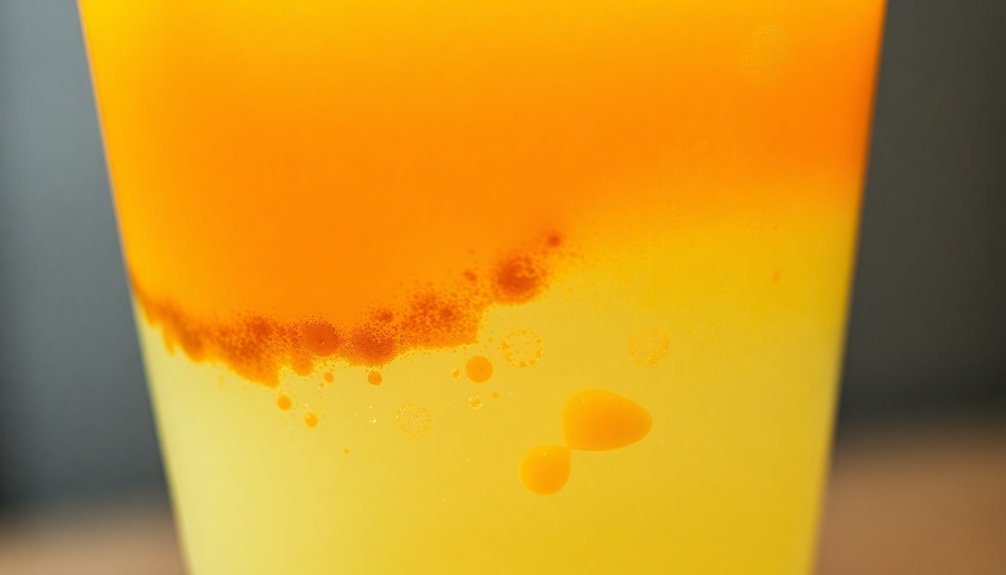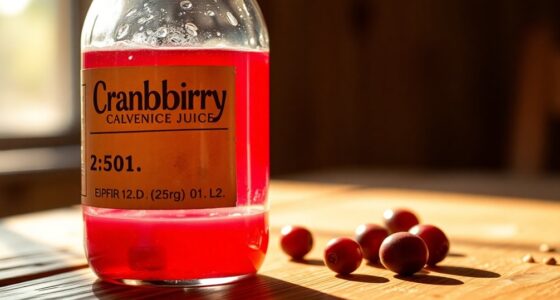To tell if orange juice is bad, start by checking the carton for any bloating or swelling, which means gas buildup. Next, observe the color; it should be bright and vibrant. Smell the juice too; a fresh, citrusy aroma is ideal, while a vinegar-like scent indicates spoilage. Don't forget to check the texture—smooth is good, while fizzy suggests fermentation. Lastly, always look at the expiration date. Keep these tips in mind, and you'll know what to watch for.
Key Takeaways
- Inspect the carton for bloating or swelling, which indicates potential gas buildup from spoilage or fermentation.
- Observe the juice color; fresh orange juice is bright and vibrant, while significant discoloration suggests spoilage.
- Smell the juice; any rancid or vinegar-like odor indicates bacterial growth and spoilage.
- Check the texture; fresh juice should be smooth, while a fizzy or bubbly texture signals fermentation and spoilage.
- Always check the expiration date; juice past this date is best discarded for safety.

When you grab a carton of orange juice from the fridge, it's important to know how to tell if it's gone bad. Fresh orange juice can be a delicious and nutritious addition to your breakfast, but spoiled juice can lead to unpleasant experiences. To keep your taste buds happy and your stomach safe, you need to check for several signs of spoilage before pouring a glass.
Start with a good container inspection. Look for any bloating or swelling in the carton. If it's puffed up, it could mean that gas is building up inside, indicating fermentation or spoilage. This is a red flag that you shouldn't ignore.
If everything looks normal, the next step is to pour the juice into a clear glass. This allows you to observe any unusual colors or sediment that might be present. Fresh orange juice typically has a bright, vibrant color. If you notice any significant discoloration or darkening, that could point to spoilage. While slight darkening can sometimes be acceptable, anything that looks off should raise a warning flag.
Next, take a whiff. The smell of orange juice should be fresh and citrusy. If you catch a rancid or vinegar-like smell, that's a strong indicator that the juice has gone bad. Spoiled juice can develop unpleasant odors as bacteria grow, and you definitely don't want to consume anything that smells off. Your nose can be a powerful tool in identifying issues that may not be visible.
After inspecting the color and smell, it's time to focus on the texture. Fresh orange juice should have a smooth, slightly pulpy consistency. If you notice a fizzy texture, that's a clear sign of fermentation. Fermentation occurs when microorganisms break down sugars, leading to off-flavors and textures. If the juice feels bubbly or has an unusual mass, it's best to discard it.
Tasting the juice can also provide clues—if it has an off flavor, it’s a definite sign you shouldn’t drink it. Additionally, examining the color and consistency of the juice can reveal important information. A cloudy appearance or unusual sediment may indicate spoilage. These factors are crucial for how to identify bad apple juice, ensuring you prioritize safety over taste. Always trust your senses, as they are often the best indicators of whether the juice is still good to consume.
Lastly, pay attention to the expiration date on the carton. While this isn't an absolute indicator of whether the juice is still good, it can help you gauge freshness. If the juice is past its expiration date, it's a good idea to err on the side of caution.
Frequently Asked Questions
What Are the Symptoms of Bad Orange Juice?
When you're checking orange juice for spoilage, look for key symptoms. A rancid or vinegar-like smell is a clear warning sign.
If you spot any visible mold, it's time to toss it. Watch for unusual color changes, like darkening or paleness, and check the container for bulging, which indicates fermentation.
Lastly, if the juice tastes off or fizzy, don't risk it—dispose of it immediately to avoid health issues.
How Long Can Orange Juice Stay in the Fridge?
Imagine your fridge as a treasure chest, holding vibrant orange juice that brightens your mornings.
When unopened, it can stay fresh for about 1 to 1.5 weeks. Once you pop that seal, aim to drink it within 7 to 10 days for the best flavor.
If you've squeezed it fresh, enjoy it within 2 to 3 days. Always check the "best by" date to keep that liquid sunshine at its peak!
What Does Expired Orange Juice Look Like?
When you look at expired orange juice, you might notice a darker or faded color, which signals it's lost its freshness.
If you see any mold—whether it's white, green, or black—it's time to toss it out.
A bulging container indicates gas buildup, while unusual sediment or lumps suggests spoilage.
Lastly, if the juice smells rancid or like vinegar, don't drink it; it's definitely past its prime.
Is It Okay to Drink Old Orange Juice?
Ah, the thrill of living on the edge with old orange juice!
You might think it's just juice, but drinking it can be a risky game. If it's opened and past the 7 to 10-day mark, or if it smells like a science project gone wrong, you're better off skipping it.
While unopened juice can last a bit longer, trust your senses. If it seems off, toss it; your stomach will thank you later!
Conclusion
In the end, trust your senses when it comes to orange juice. If it smells sour, looks cloudy, or tastes off, it's time to toss it out. Just like a vibrant sunrise, fresh juice should bring brightness to your day, while spoiled juice can cast a shadow. So, keep your taste buds happy and your fridge stocked with the good stuff. Remember, when in doubt, it's better to be safe than sorry!
Cindy thoroughly researches juicing trends, techniques, and recipes to provide readers with practical advice and inspiration. Her writing style is accessible, engaging, and designed to make complex concepts easy to understand. Cindy’s dedication to promoting the advantages of juicing shines through her work, empowering readers to make positive changes in their lives through the simple act of juicing.

















